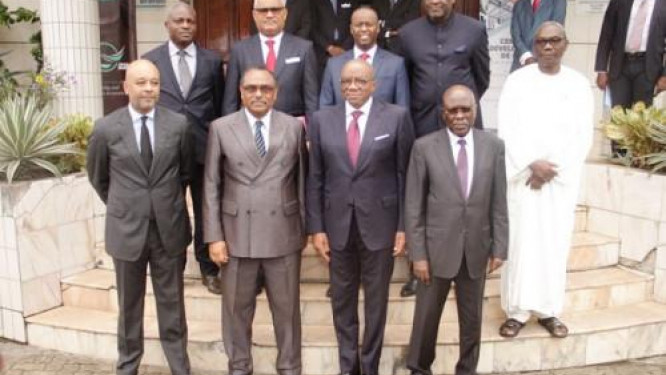Central African Business Bosses Say Anti-COVID-19 Measures Insufficient

Business bosses drawn from the six Central African Economic and Monetary Community (CEMAC) countries have rubbished initial economic palliatives measures put in place to fight against the COVID-19 pandemic which has devastated the economies of all CEMAC member countries.
The six countries are Cameroon, Chad, Gabon, Equatorial Guinea, Democratic Republic of Congo and Chad, all of which economies depend to a large extent on oil revenues – which dropped to record lows recently – have been perilously hit by the COVID-19 effects on their economies.
Meeting in a videoconference recently chaired by Celestin Tawamba, President of the Inter-Patronal Grouping of Cameroon, popularly known by its French acronym, GICAM, the Central African Patronal Union (UNIPACE) expressed serious worries over the sanitary and economic effects of the COVID-19 pandemic on the sub-region.
“Faced with the current situation, UNIPACE regrettably notes that the economic governance in the sub-region remains problematic and poses a serious problem as concerns the management of the crises; takes into account the inefficiency and insufficient urgent measures taken by the CEMAC member states; takes into consideration the considerable negative impact that the crises has on the budgets of the member states because of the heavy dependence of their economies on petroleum which prices have experienced big falls.”
The UNIPACE members thus demand that CEMAC authorities urgently work in consonance with patronal organisations, through direct dialogue in preparing efficient measures to support the economies of member states, which are faced with an economic shock linked to the COVID -19 crisis and to verily begin the process of sub-regional integration.
It should be noted that almost all the CEMAC member countries have been dragging their feet in applying veritable economic incentives that would cushion the negative effects of the COVID -19 pandemic on the economies and peoples of their countries.
Economic operators have been calling for deep tax exemptions and moratoriums on debts incurred from the banks as well as the suspension of payment of water and electricity bills by ordinary communities to corporations providing the utilities to no avail.
“The few palliative measures taken here (Cameroon) benefit mostly the rich through their companies and nothing has been done for the good of the poor man inthe street.
“We are still compelled to pay water and electricity bills which only go to swell the coffers of multi-nationals (partly owned by those in power) providing these essential services.
“I will still pay the normal taxes I have been paying over the years as nothing was provided for us in the anti- COVID -19 measures taken by the government so far,” Gerald Musonge, owner of a beer outfit in Church Street, Limbe, complained.
Support Our Journalism
There are millions of ordinary people affected by conflict in Africa whose stories are missing in the mainstream media. HumAngle is determined to tell those challenging and under-reported stories, hoping that the people impacted by these conflicts will find the safety and security they deserve.
To ensure that we continue to provide public service coverage, we have a small favour to ask you. We want you to be part of our journalistic endeavour by contributing a token to us.
Your donation will further promote a robust, free, and independent media.
Donate HereStay Closer To The Stories That Matter




